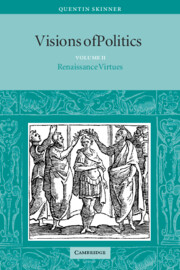Book contents
- Frontmatter
- Contents
- List of plates
- General preface
- Full contents: Volumes 1–3
- Acknowledgements
- Conventions
- 1 Introduction: The reality of the Renaissance
- 2 The rediscovery of republican values
- 3 Ambrogio Lorenzetti and the portrayal of virtuous government
- 4 Ambrogio Lorenzetti on the power and glory of republics
- 5 Republican virtues in an age of princes
- 6 Machiavelli on virtù and the maintenance of liberty
- 7 The idea of negative liberty: Machiavellian and modern perspectives
- 8 Thomas More's Utopia and the virtue of true nobility
- 9 Humanism, scholasticism and popular sovereignty
- 10 Moral ambiguity and the Renaissance art of eloquence
- 11 John Milton and the politics of slavery
- 12 Classical liberty, Renaissance translation and the English civil war
- 13 Augustan party politics and Renaissance constitutional thought
- 14 From the state of princes to the person of the state
- Bibliographies
- Index
- Plate section
2 - The rediscovery of republican values
Published online by Cambridge University Press: 05 September 2012
- Frontmatter
- Contents
- List of plates
- General preface
- Full contents: Volumes 1–3
- Acknowledgements
- Conventions
- 1 Introduction: The reality of the Renaissance
- 2 The rediscovery of republican values
- 3 Ambrogio Lorenzetti and the portrayal of virtuous government
- 4 Ambrogio Lorenzetti on the power and glory of republics
- 5 Republican virtues in an age of princes
- 6 Machiavelli on virtù and the maintenance of liberty
- 7 The idea of negative liberty: Machiavellian and modern perspectives
- 8 Thomas More's Utopia and the virtue of true nobility
- 9 Humanism, scholasticism and popular sovereignty
- 10 Moral ambiguity and the Renaissance art of eloquence
- 11 John Milton and the politics of slavery
- 12 Classical liberty, Renaissance translation and the English civil war
- 13 Augustan party politics and Renaissance constitutional thought
- 14 From the state of princes to the person of the state
- Bibliographies
- Index
- Plate section
Summary
The Italian city-republics first began to develop their distinctive political systems as early as the closing decades of the eleventh century. It was then that a number of northern communes took it upon themselves, in defiance of papal as well as imperial suzerainty, to appoint their own ‘consuls’ and invest them with supreme judicial authority. This happened at Pisa in 1085 (the earliest recorded instance), at Milan, Genoa and Arezzo before 1100, and at Bologna, Padua, Florence, Lucca, Siena and elsewhere by the 1140s. During the second half of the twelfth century a further important development took place. The consular system was gradually replaced by a form of government centred on ruling councils chaired by officials known as podestà, so called because they were granted supreme power or potestas in executive as well as judicial affairs. Such a system was in place at Padua by the 1170s, at Milan by the 1180s, and at Florence, Pisa, Siena and Arezzo by the end of the century.
By the opening years of the duecento, many of the richest communes of Lombardy and Tuscany had thus acquired the status of independent city-republics, with written constitutions guaranteeing their elective and self-governing arrangements. For all their self-confidence, however, these urban communities remained deeply anomalous within the legal structures of thirteenth-century Europe. Technically they were mere vassals of the Holy Roman Empire, which vigorously pursued its claims over northern Italy (the so-called Regnum Italicum) throughout the late twelfth and early thirteenth centuries.
- Type
- Chapter
- Information
- Visions of Politics , pp. 10 - 38Publisher: Cambridge University PressPrint publication year: 2002
- 2
- Cited by

